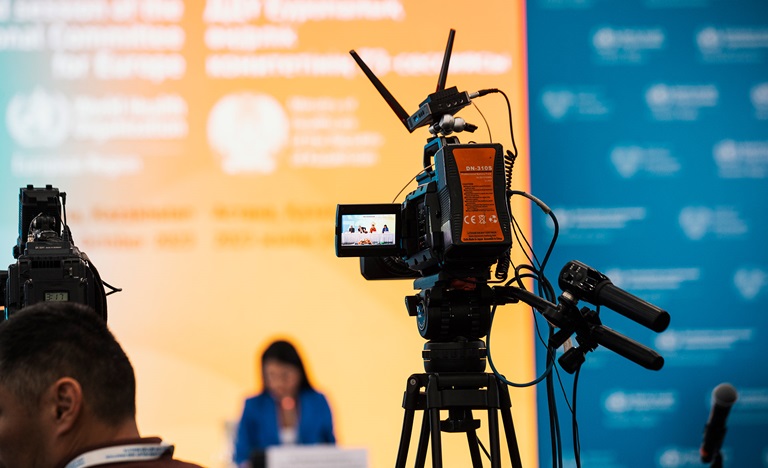
Newsroom
Media Contacts
![]()
WHO/Europe Press Office
Email: eupress@who.int
Latest news
All →New WHO study shows health workers feel more confident to recommend COVID-19 vaccination following a training on patient communication
A newly launched evaluation report from WHO/Europe underscores the positive impact that communication training has on building the capacity of health workers to effectively communicate the benefits of COVID-19 vaccination and proactively address questions and concerns raised by patients and the public.
Health workers play a critical role in positively influencing vaccine acceptance and uptake. They continue to be among the most trusted sources when it comes to vaccination, leading by example and encouraging patients to accept COVID-19 vaccination.
To support health workers, WHO/Europe developed a comprehensive training module and resource package entitled “Communicating with patients about COVID-19 vaccination”.
In collaboration with the Department of Hygiene, Social and Preventive Medicine and Medical Statistics in the School of Medicine at the Aristotle University of Thessaloniki in Greece, and the Panhellenic Pharmacist Association (PEF), WHO/Europe conducted a comprehensive evaluation of the training module to determine its effectiveness in fostering health workers’ skills and confidence in recommending COVID-19 vaccination and addressing patients’ concerns.
The evaluation was the first to be based on WHO/Europe’s recently released “Guide to evaluating behaviourally and culturally informed health interventions in complex settings”.
As part of the evaluation project, a series of 3 online training workshops on how to talk with patients about COVID-19 vaccination was facilitated by WHO/Europe in collaboration with the WHO Country Office in Greece and the Ministry of Health of Greece. In attendance were 118 health workers from across the country, including pharmacists, doctors and nurses.
“The training reminded me of patient-centred care, and I have started to practise it,” explained a physician who participated in a workshop. “I used to talk as a doctor, repeating scientific data, while now I am trying to focus on the needs and the perceptions of each patient, using all the communication strategies we discussed in the training. In this way, I try to win the trust of patients more and make them realize I am mainly interested in their well-being,”
The evaluation guide developed by WHO/Europe helped the facilitators explore both the immediate and the possible secondary outcomes of these trainings. Multiple methods were used to collect data from participants, including pre- and post-training surveys, in-depth interviews, simulated online observation of conversations between health workers and patients, and focus group discussions.
Addressing vaccine acceptance and demand through health workers’ communication skills
The evaluation results confirmed that the training module largely achieved its main objective of strengthening participants’ confidence in being able to facilitate effective conversations with patients to promote acceptance of COVID-19 vaccination.
As one physician participant noted, “Since the training, I have started to listen more, to be reflective, to use the algorithm and it really worked. Patients that hadn’t been vaccinated until now are at least considering vaccination.” Another remarked, “Having some communication guidelines and the relevant knowledge helps me in terms of my self-confidence.”
Confidence was highest immediately after the training, and remained high both 1 month and 3 months afterwards. Participants reported a significant increase in their use of some of the newly acquired communication skills, and described the skills as easy to use and effective when conversations with patients about vaccination are challenging.
Additionally, participants expressed the intention to continue using the new skills, not only for COVID-19 vaccination but also for consultations on medical conditions in everyday clinical practice. “I certainly intend to use these tools, because they can make my everyday practice easier,” said another physician.
Impact on trust, well-being and feelings of social cohesion
The evaluation also identified possible secondary outcomes of the training. There was strong consensus among the participants that the skills learned in the training contribute to building trusting relationships with patients.
The training also had a positive impact on participants’ well-being, resulting in improved cooperation with patients and coworkers and feelings of being more effective in their efforts at work. Some also reported that the communication skills help to strengthen social relations at work through enhanced social support, teamwork and conflict resolution.
Reaching health workers across the Region
The evaluation study outcomes indicate that the training module is a useful tool for building the capacity of health workers throughout the WHO European Region to promote vaccine confidence and uptake. Trainings of this kind can also help optimize working conditions and motivate health workers in their role as advocates for immunization.
To date, WHO/Europe has conducted 40 health worker trainings on communicating with patients about COVID-19 vaccination. Online and in-person trainings have been held in Armenia, Belarus, Bosnia and Herzegovina, Greece, Hungary, Kazakhstan, Kyrgyzstan, Montenegro, Romania, the Russian Federation, Serbia, and Turkmenistan, as well as Kosovo (in accordance with United Nations Security Council Resolution 1244 (1999)). The trainings have engaged over 3000 health workers, including general practitioners, medical specialists, nurses and pharmacists.
The training module and its accompanying tools have been adapted to various country contexts and made available to all Member States of the Region.




